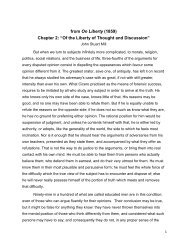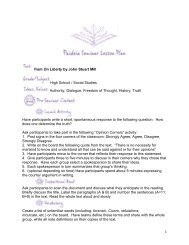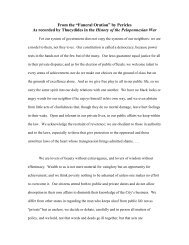Rousseau_contrat-social
You also want an ePaper? Increase the reach of your titles
YUMPU automatically turns print PDFs into web optimized ePapers that Google loves.
5. THE TRIBUNATE<br />
WHEN an exact proportion cannot be established between the constituent<br />
parts of the State, or when causes that cannot be removed continually<br />
alter the relation of one part to another, recourse is had to the<br />
institution of a peculiar magistracy that enters into no corporate unity<br />
with the rest. This restores to each term its right relation to the<br />
others, and provides a link or middle term between either prince and<br />
people, or prince and Sovereign, or, if necessary, both at once.<br />
This body, which I shall call the tribunate, is the preserver of the<br />
laws and of the legislative power. It serves sometimes to protect the<br />
Sovereign against the government, as the tribunes of the people did at<br />
Rome; sometimes to uphold the government against the people, as the<br />
Council of Ten now does at Venice; and sometimes to maintain the balance<br />
between the two, as the Ephors did at Sparta.<br />
The tribunate is not a constituent part of the city, and should have no<br />
share in either legislative or executive power; but this very fact makes<br />
its own power the greater: for, while it can do nothing, it can prevent<br />
anything from being done. It is more sacred and more revered, as the<br />
defender of the laws, than the prince who executes them, or than the<br />
Sovereign which ordains them. This was seen very clearly at Rome, when<br />
the proud patricians, for all their scorn of the people, were forced to<br />
bow before one of its officers, who had neither auspices nor<br />
jurisdiction.<br />
The tribunate, wisely tempered, is the strongest support a good<br />
constitution can have; but if its strength is ever so little excessive,<br />
it upsets the whole State. Weakness, on the other hand, is not natural<br />
to it: provided it is something, it is never less than it should be.<br />
It degenerates into tyranny when it usurps the executive power, which it<br />
should confine itself to restraining, and when it tries to dispense with<br />
the laws, which it should confine itself to protecting. The immense<br />
power of the Ephors, harmless as long as Sparta preserved its morality,<br />
97











